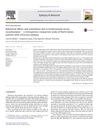 19 citations,
February 2023 in “Environmental and experimental botany”
19 citations,
February 2023 in “Environmental and experimental botany” Jasmonic acid helps plants grow, defend against threats, and survive stressful conditions like drought and salt.
 41 citations,
June 2018 in “Medicine Health Care and Philosophy”
41 citations,
June 2018 in “Medicine Health Care and Philosophy” The article suggests using four questions to tell apart necessary medicalization from excessive medicalization, focusing on problem significance, social expectations, medical understanding, and effective resolution.
 3 citations,
August 2011 in “Current Psychiatry Reviews”
3 citations,
August 2011 in “Current Psychiatry Reviews” Family-based treatment is the best outpatient care for stable teens with anorexia, and more research is needed on medication and treatment effectiveness for young people with eating disorders.
 18 citations,
January 2020 in “Journal of Clinical Research in Pediatric Endocrinology”
18 citations,
January 2020 in “Journal of Clinical Research in Pediatric Endocrinology” The document concludes that Functional Hypothalamic Amenorrhea should be carefully diagnosed and managed to prevent health complications, using lifestyle changes and specific medications.
 August 2023 in “Medicina-lithuania”
August 2023 in “Medicina-lithuania” Abusing steroids can damage your heart, muscles, reproductive system, liver, skin, and brain, and may increase the risk of Alzheimer's disease.
 5 citations,
March 2019 in “Facial Plastic Surgery Clinics of North America”
5 citations,
March 2019 in “Facial Plastic Surgery Clinics of North America” The document concludes that gender-affirming treatments are essential for transgender individuals and outlines safe hormone therapy practices.
 31 citations,
November 2000 in “Journal of the European Academy of Dermatology and Venereology”
31 citations,
November 2000 in “Journal of the European Academy of Dermatology and Venereology” Skin problems can be linked to sexual abuse, requiring careful medical and psychological evaluation.
 13 citations,
July 2019 in “Pediatric dermatology”
13 citations,
July 2019 in “Pediatric dermatology” Pediatric dermatologists need to understand the unique skin health needs of LGBTQIA youth to provide better care.
 12 citations,
April 2018 in “Physiology & Behavior”
12 citations,
April 2018 in “Physiology & Behavior” Finasteride raises suicide-linked aggression and stops clozapine's positive effects in schizophrenia animals.
 September 2023 in “Fides et Ratio”
September 2023 in “Fides et Ratio” The safety and effectiveness of gender-affirming treatments for children are uncertain, with potential long-term risks like infertility.
 9 citations,
March 2019 in “European Journal of Sport Science”
9 citations,
March 2019 in “European Journal of Sport Science” New signs like changes in blood markers, physical symptoms, and behavioral shifts may help detect hidden steroid use in athletes.
 March 2017 in “De Gruyter eBooks”
March 2017 in “De Gruyter eBooks” The Leechbook shows how hair and sexual health were key to medieval masculinity and some remedies may still be useful.
 14 citations,
February 2018 in “Psychoneuroendocrinology”
14 citations,
February 2018 in “Psychoneuroendocrinology” Mice lacking steroid 5α-reductase 2 show less aggression and better impulse control.
 117 citations,
August 2008 in “Sociology of Health and Illness”
117 citations,
August 2008 in “Sociology of Health and Illness” The conclusion is that the increasing use of drugs for lifestyle reasons is a complex issue influenced by corporate profit, consumer behavior, and the medicalization of everyday life, with potential negative effects on personal well-being.
82 citations,
May 2010 in “PLoS neglected tropical diseases” Secondary syphilis in Cali, Colombia, shows high Treponema pallidum presence and challenges in early diagnosis, needing better public health strategies.
 84 citations,
February 2013 in “Clinica chimica acta”
84 citations,
February 2013 in “Clinica chimica acta” Hair mineral analysis might help diagnose diseases early, but standard methods are needed.
 September 2023 in “Reproductive health of woman”
September 2023 in “Reproductive health of woman” PCOS is common, affects fertility, and requires personalized treatment to manage symptoms and health risks.

Accurate diagnosis of cicatricial alopecias requires thorough scalp examination and multiple biopsy techniques.
 May 2009 in “The American Journal of Dermatopathology”
May 2009 in “The American Journal of Dermatopathology” Mast cells play a significant role in hair loss conditions like male pattern hair loss and alopecia areata.
14 citations,
September 2017 in “Hormones and behavior” δ-GABAA receptors affect alcohol consumption based on the estrous cycle and influence movement regardless of the cycle.
 57 citations,
March 2019 in “Immunity”
57 citations,
March 2019 in “Immunity” The document concludes that the skin's immune system is complex, involving interactions with hair follicles, nerves, and microbes, and can protect or cause disease, offering targets for new treatments.
 55 citations,
July 1999 in “Clinics in Sports Medicine”
55 citations,
July 1999 in “Clinics in Sports Medicine” Athletes use steroids to enhance performance despite health risks and legal issues, and education on their dangers is needed.
 254 citations,
September 2014 in “Menopause”
254 citations,
September 2014 in “Menopause” The NAMS 2014 recommendations guide healthcare providers on treating health issues in midlife women, emphasizing individualized care and informed decision-making.
 1 citations,
January 2020 in “Elsevier eBooks”
1 citations,
January 2020 in “Elsevier eBooks” Forensic medicine is crucial for justice and needs continuous innovation and technology integration.

Both books are valuable resources in their fields.
 September 2014 in “Springer eBooks”
September 2014 in “Springer eBooks” The document concludes that breast pain should be managed with personalized treatment, starting with non-drug methods and progressing to medication if necessary, while considering side effects and patient needs.
 1 citations,
July 1998 in “JAMA”
1 citations,
July 1998 in “JAMA” The book provides a historical view of abortion in the U.S., critiques the pro-choice movement, and recommends including abortion in medical education.
 10 citations,
October 2016 in “Epilepsy & behavior”
10 citations,
October 2016 in “Epilepsy & behavior” Levetiracetam often causes behavioral issues, while oxcarbazepine is more likely to cause sleepiness in epilepsy patients.

Female rats showed more panic-related behavior than males, influenced by hormonal cycles and certain drugs.
 57 citations,
June 2021 in “Science”
57 citations,
June 2021 in “Science” Women inventors focus more on women's health, but there are few of them.




























